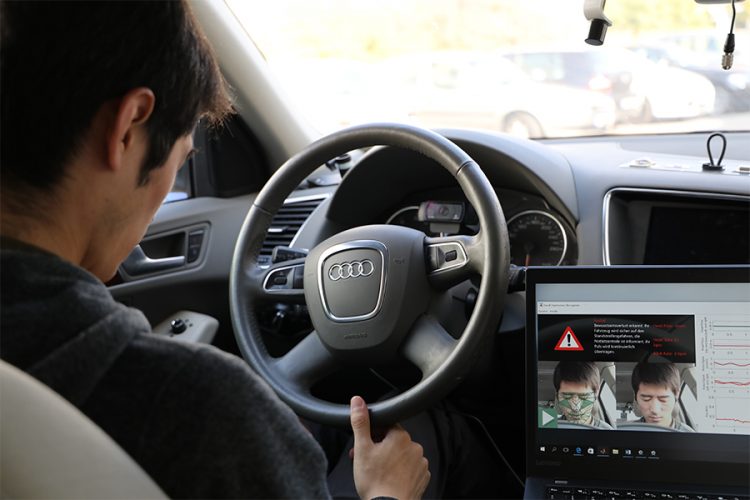When your car knows how you feel

The FZI presents a "Camera-based driver state monitoring" system at CES in Las Vegas. FZI
From January 9 to 12, the FZI Research Center for Information Technology will present a system for camera-based vital parameter recognition at the International Consumer Electronics Show (CES). Following the invitation of IAV Automotive Engineering, the FZI has the opportunity to present its latest research on embedded systems and sensors technologies to a wide audience of experts in Las Vegas.
For the project “Camera-based Driver State Monitoring”, FZI researchers are developing a prototype for camera-based measurement of vital parameters during a car ride. A camera inside the vehicle measures factors such as heart and blink rate, head pose and emotions of the driver and continuously evaluates the information.
“In this way, we gain a comprehensive and constantly updated picture of the driver state. Thus, we are able to improve the interaction between the driver and the vehicle,” explains Timon Blöcher, researcher at the FZI.
The Karlsruhe researchers use an off-the-shelf webcam for the project without attaching sensors to the driver and without using special lighting. The system is able to autonomously recognise facial areas and to derive the driver’s stress and fatigue level with the help of innovative image and signal processing algorithms.
The measurements also give some indication of the driver’s attentiveness or excitement level. The collected information allows a conclusion to be drawn about the individual driving behaviour. In combination with modern driver assistance systems, such as a distraction warning system or a medical emergency brake assistant, the camera-based measurement can make driving more predictable and thus safer.
The International Consumer Electronics Show (CES) is one of the world’s largest trade fairs for consumer electronics. In 2018, the FZI will be present at the CES for the first time. The researchers around FZI director Prof. Dr.-Ing. Eric Sax can be found at the booth of IAV in the Las Vegas Convention Center, North Plaza, NP-13, NP-13b.
About the FZI Research Center for Information Technology
The FZI Research Center for Information Technology at the Karlsruhe Institute of Technology is a non-profit institution for applied research in information technology and technology transfer. Its task is to provide businesses and public institutions with the latest research findings in information technology. It also qualifies young researchers for their career in academics or business as well as self-employment. Led by professors from different faculties, research teams at the FZI interdisciplinarily develop and prototype concepts, software, hardware and system solutions for their clients.
The FZI House of Living Labs represents a unique research environment for applied research. Every department at the FZI operates under a certified quality management system according to DIN EN ISO 9001:2015. The head office is located in Karlsruhe.
The FZI has one branch office in Berlin.
Further information
Julia Feilen, FZI Corporate Communications and Media
FZI Research Center for Information Technology
Haid-und-Neu-Str. 10-14, 76131 Karlsruhe, Germany
Phone: +49 721 9654-943
Email: feilen@fzi.de
Web: www.fzi.de/en
http://url.fzi.de/201220172 Further Information and Photos
Media Contact
All latest news from the category: Automotive Engineering
Automotive Engineering highlights issues related to automobile manufacturing – including vehicle parts and accessories – and the environmental impact and safety of automotive products, production facilities and manufacturing processes.
innovations-report offers stimulating reports and articles on a variety of topics ranging from automobile fuel cells, hybrid technologies, energy saving vehicles and carbon particle filters to engine and brake technologies, driving safety and assistance systems.
Newest articles

Can lab-grown neurons exhibit plasticity?
“Neurons that fire together, wire together” describes the neural plasticity seen in human brains, but neurons grown in a dish don’t seem to follow these rules. Neurons that are cultured…

Unlocking the journey of gold through magmatic fluids
By studying sulphur in magmatic fluids at extreme pressures and temperatures, a UNIGE team is revolutionising our understanding of gold transport and ore deposit formation. When one tectonic plate sinks…

3D concrete printing method that captures carbon dioxide
Scientists at Nanyang Technological University, Singapore (NTU Singapore) have developed a 3D concrete printing method that captures carbon, demonstrating a new pathway to reduce the environmental impact of the construction…



